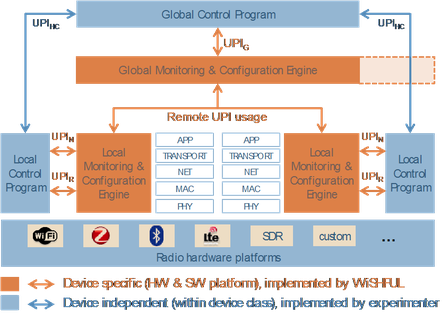Leadership in enabling and industrial technologies - ICT - WiSHFUL
H2020 LEIT ICT

Partners: 8 partners:
• imec VZW – Belgium (coordinator)
• The Provost, Fellows, Foundation Scholars & the Other Members of Board of the College of the Holy & Undivided Trinity of Queen Elizabeth near Dublin - Ireland
• Consorzio Nazionale Interuniversitario per le Telecomunicazioni (CNIT) - Italy
• Technische Universität Berlin - Germany
• nCentric - Belgium
• Rutgers University - USA
• Seoul National University - South Korea
• Federal University of Rio De Janeiro - Brazil
Duration: 40 months
Start: 1 January 2015
Wireless testbeds have become an essential tool to develop and validate innovative wireless solutions. However, due to the increasing diversity of wireless solutions and competing radio technologies, along with the ever more stringent requirements on the reliability of test results, wireless test facilities have evolved to very complex systems with steep learning curves for innovators. To speed up and facilitate the experimentation process, to lower its cost and to enhance the uptake of future non- and pre-standard solutions, the WiSHFUL project is determined to lower the experimentation threshold by developing flexible, scalable, open software architectures and programming interfaces for prototyping novel wireless solutions for a variety of applications ranging from healthcare to smart cities, supporting players in high value-add markets with considerable growth potential.
Key features of WiSHFUL include (1) unified radio control, providing developers with deep control of physical and medium access components without requiring deep knowledge of the radio hardware platform and (2) unified network control allowing the rapid creation, modification, and prototyping of protocols across the entire stack.
WiSHFUL also develops a portable testbed, consisting of portable facilities that can be deployed easily and efficiently at any location, allowing validation of innovative wireless solutions in the real world (with realistic propagation and interference characteristics) and involving real users. The usefulness of these facilities is confirmed by participation of industrial and academic partners through open calls for experimentation.
In addition, WiSHFUL envisions to extend these facilities with the capability to experiment with emerging wireless technologies such as LTE, full-duplex and advance antennas in the scope of open calls for extensions.
Objectives
These are the objectives of eWINE:
• to reduce threshold for experimentation in view of stimulating wireless innovation by (i) building open, flexible & adaptive software platforms with unified programming interfaces (UPIs) for intelligent radio and network control, and (ii) by offering these software platforms in wireless Fed4FIRE compliant test facilities
• to increase the realism of experimentation by offering portable testbeds that can be deployed at any location allowing validation in the real world and involving real users
• to attract Third Parties for experimentation for validating innovative wireless solutionsusing WiSHFUL software platforms and interfaces, and using (portable) facilities and hardware supported by WiSHFUL
• to attract Third Parties for extending the WiSHFUL test facilities with (i) new software functionality for the WiSHFUL software platforms, (ii) new hardware compliant with WiSHFUL software platforms at least supporting the WiSHFUL UPIs, and (iii) new testbeds that are Fed4FIRE compliant and offer WiSHFUL software platforms and their UPIs
Role of Ghent University
The IDLab core research group embedded at the Ghent University is coordinator
Contact
Prof. Ingrid Moerman
Department of Information Technology (IDLab)
Phone number: 09 33 14 926
E-mail: ingrid.moerman@ugent.be